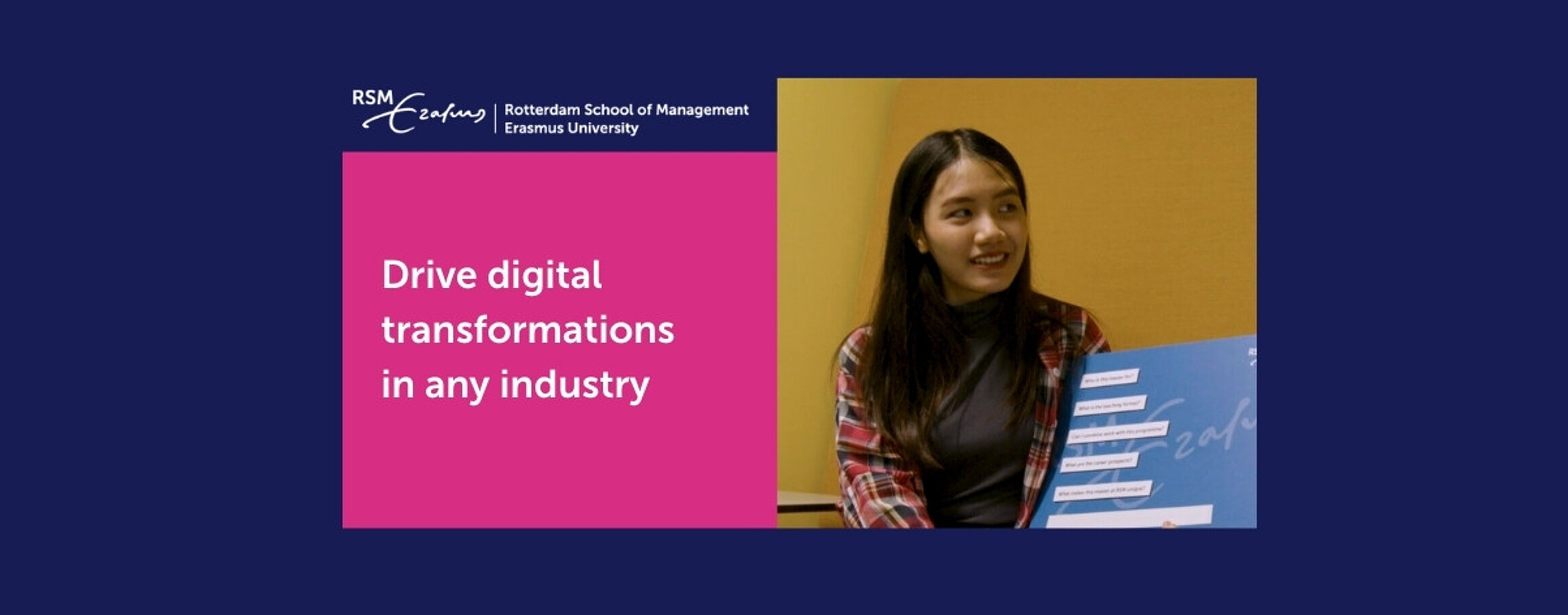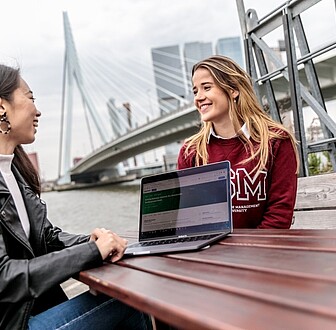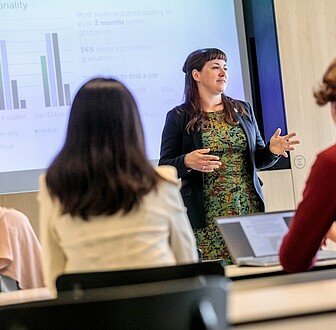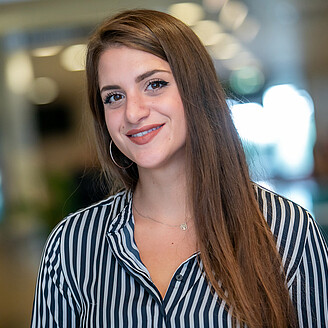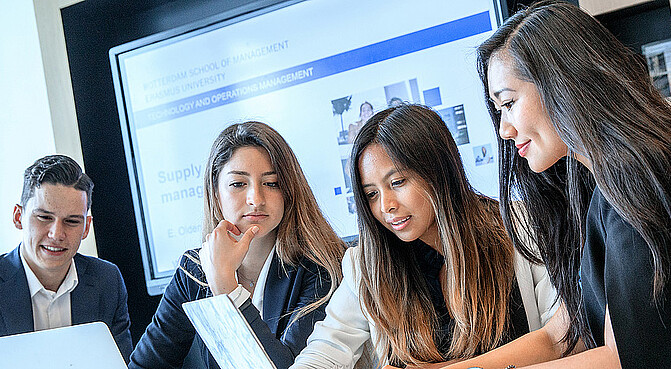Curriculum
Do you want to know more about the MSc Business Information Management programme?
The video below will answer the most frequently asked questions about the programme.
Overview
The MSc in Business Information Management programme is one academic year’s duration. Core courses are compulsory and will be offered during the autumn semester (24 EC). Master electives (18 EC) are offered during the spring semester, of which one elective can be chosen from another MSc programme. It is also possible to replace an elective with the BIM Company-Based Research Project (CRP). During the year, students work on a master thesis project (18 EC).
MSc programmes are often associated with a research group, guided by accomplished researchers making meaningful contributions in their respective fields. The faculty team consists of active researchers globally recognized in the fields of Information Systems, Management and Data Science. For a closer look at the exciting research initiatives by our academic faculty, we encourage you to explore the department of Technology and Operations Management under which the MSc in Business Information Management falls.
Academic calendar
Please note that core courses and electives are subject to change each academic year. While some electives are very popular and we can place most students in the elective(s) of their choice, there are no guaranteed places.
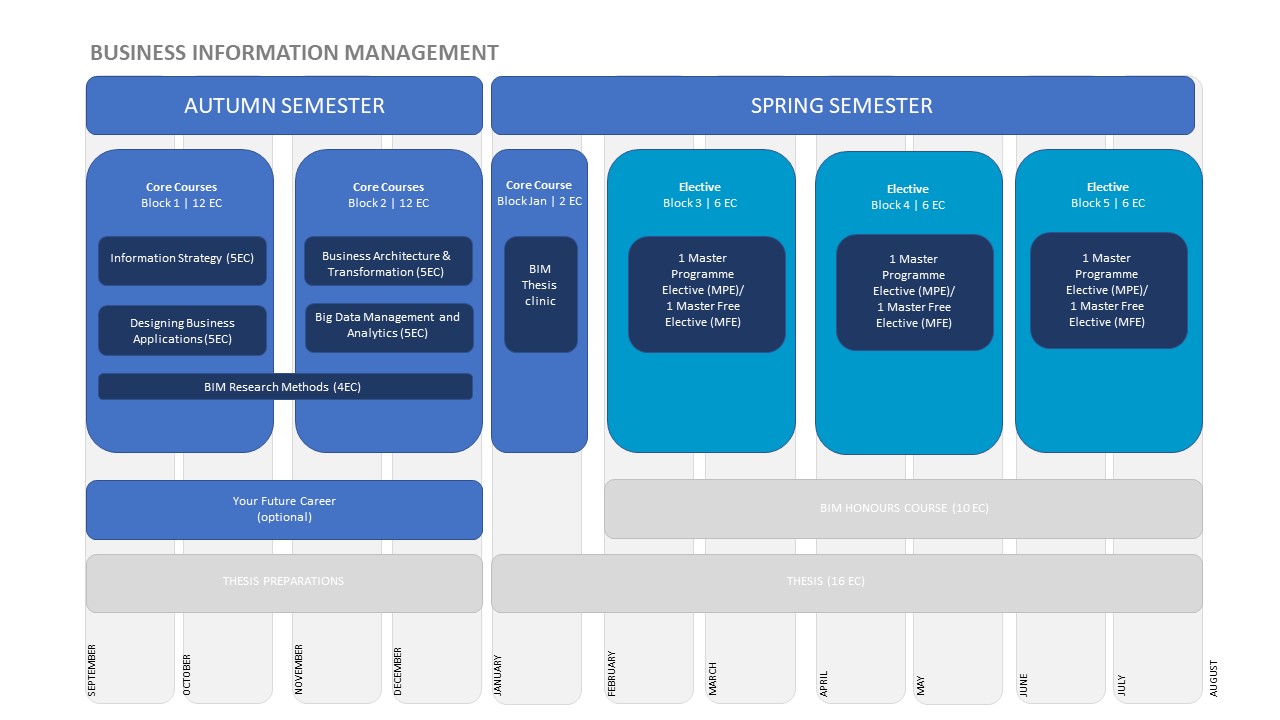
Autumn semester - core courses
In the core courses, we offer a management, and a technical foundation. In the management foundation, we focus on how digital transformation impacts digital strategies that can lead to competitive advantage (Information Strategy), and how does it impact internal processes lead by CIO’s (Business Architecture and Transformation). In the technical foundation, we focus on how to translate a business idea to technical requirements (Designing Business Applications), and the entire life cycle of data science, from collecting, analysing, presenting, and visualizing data (Big Data Management and Applications). In the research foundation, we teach all the necessary methods and tools to allow you to conduct your own research (BIM Research Methods and BIM Thesis Clinic). Lastly, we offer the opportunity for an extracurricular course to support your professional development Your future career.
Spring semester - electives
The electives* are separated in two different tracks that the students can follow.
For a detailed description of all of the courses including electives, please view the course catalogue (for reference only, catalogue continually updated throughout the year).
*Please note that certain electives may be very popular. Although we can place most students in the elective(s) of their choice, there are no guaranteed places.
Digital Business Track
In the Digital Business track, the electives focus on the business side of managing technology.
The electives available in this track, are the following:
- Innovation in the Digital Age
- Digital Technologies & Social Change
- Navigating the Future of Work
- AI Technologies for Circular Business
- Data Privacy and Cybersecurity
- Strategy and Economics of Platforms
- Digital Energy Transition
- Human AI/Computer Interaction
For a detailed description of all of the courses including electives, please view the course catalogue (for reference only, catalogue continually updated throughout the year)
Data Science Track
In the Data Science track, the electives focus on the latest advances in methods and technologies which allow to collect and analyze data (using R and/or Python).
The electives available in this track, are the following:
- Programming for Managers
- Web mining and Analytics
- Big Data and Business Analytics
- Introduction to Data Science with Python
- Introduction to Deep Learning
For a detailed description of all of the courses including electives, please view the course catalogue (for reference only, catalogue continually updated throughout the year)
BIM company based research project
The BIM Company-Based Research Project (CRP) allows students to replace one free elective course in the program with a full-time thesis / research internship of minimum 168 hours, for one of the elective blocks. During the other two blocks, the student should follow the remaining electives and may continue working part-time.
The BIM CRP should seek to combine the writing of the thesis with an internship at a company during one of the elective blocks. It is therefore important that the internship is related to the thesis and students will need to decide on an internship in consultation with their thesis coach and the master thesis coordinator. Students must be able to show that the internship will allow them to collect company-specific data (for that specific company), and that it is essential for their thesis project.
The CRP will be assessed separately from the thesis (on a pass/fail basis) by the thesis coach, company supervisor and master thesis coordinator.
Research methods & thesis
The writing of your master thesis – the report of your scientific study – is the most important part of the Business Information Management programme. During the year you will participate in a structured master thesis trajectory.
BIM Thesis Clinic
One of the reasons companies hire university graduates, is because of their academic posture. This includes a critical attitude towards what is presented as “the truth”, the ability to assess the quality of research presented to them, and the competence to study a phenomenon in a structured way. These same qualities are required of you as you design and execute your Master thesis project. This course will focus on the basics of conducting sound scientific research and writing a good master thesis.
BIM Master Thesis
During the year you will participate in a structured master thesis trajectory. You will start in September, during the core courses, to familiarize yourself with the research being done at our department and the relevant academic literature and topics available. Staff involved in this MSc will present their current research projects, and you will be invited to link your master thesis to one of these projects. Before Christmas you will decide on a final topic and be assigned a coach who is an expert in the subject area chosen. Early January a thesis clinic will provide you with the foundation that you will need to complete your thesis successfully. In February you will deliver your research proposal after which you will implement your research question and finalize your thesis before the summer. Staff and researchers will provide assistance by coaching you through the entire master thesis process.
The following themes are examples of possible BIM Master Thesis topics:
- The Impact of IT on Business
- Online Human Behavior
- Big Data and Analytics
- Social Media and Digital Commerce
- Green IT and Energy Business
Learn more
Honours class
The BIM Honours Course offers the most talented and motivated students in the MSc BIM programme a challenging extracurricular course, with strong grounding in practice. Participation is by invitation only, whereby the best 10% of students will be selected based on their grades in the core courses. The small group size ensures that students have ample opportunities
for interaction with faculty members and participating companies.
The honours course covers a variety of topics selected by BIM faculty in collaboration with companies. There are two types of activities:
1) Company Case Days, in which students will work on full-day case programmes
2) Analytics Challenge, in which students will compete in small groups in a real-world analytics challenge
The course is designed to complement the MSc course portfolio by offering more in-depth training in selected areas of particular interest. The course
also offers networking opportunities and contacts with executives and companies.
After having completed this extracurricular course, students will have an enriched academic experience and deep knowledge of how theoretical notions can be applied in practice.
Late-February the best performing BIM MSc students will be invited to participate in the Honours Course (top 10% based on performance in the five BIM core courses). Additionally, students with an above-average performance will be allowed to apply for a spot in the Honours Course (these additional spots are made available for students who can demonstrate excellence outside of their BIM-studies). The final selection is announced early-March.
Students who successfully participate in all activities will:
- Have “Honours Course MSc Business Information Management” included on the formal list of grades that accompanies the MSc diploma with a “Pass” for 10 ECTS (extracurricular);
- Receive the certificate “Honours Course MSc Business Information Management.
Internship
You can get a taste of working life – from large multinationals to fast-growing start-ups – by applying your new wealth of knowledge to a real company problem during your internship, which is optional in your programme. The RSM Career Centre will support you in finding a suitable position. Many students acquire their first job after graduation from the contacts they make during their internship.
International exchange
Explore the world and broaden your study experiences by going on international study trips and exchanges at other top schools. RSM has an extensive partner school network of more than 100 business schools and universities worldwide, including top business schools such as ESADE in Barcelona and The Wharton School in the USA. An international exchange is an optional element after you’ve studied for your master for at least one year.
Career opportunities
There is an increasing demand from companies for graduates with a deep knowledge and understanding of the strategic value of information: the career prospects for business information management students today are excellent.
The following job descriptions are frequently applied to our graduates working for large or multinational companies or consultancy firms:
- Information Managers who analyse and implement information solutions for companies;
- Business Consultants who advise managers to develop business applications to create value;
- Business Analysts who analyse and implement new ways of doing business;
- IT Consultants who advise managers on how to develop new IT-enabled solutions;
- Business Development Managers who develop new IT-enabled business models;
- Project Managers who initiate, direct, and manage projects in and between companies;
- Management Trainees who usually follow a two-year ‘training on the job’ programme and will continue their career in a management position.
Graduates work in the following sectors:
- Management Consultancy (33%);
- Software and Computing Services (19%);
- Technology, Multi-media, and Telecom (12%);
Our top employers include:
- PriceWaterhouseCoopers (12%);
- Accenture (11%);
- LogicaCMG (11%);
Curious to see what our alumni are doing?
Good to know
Orientation year for Non-EEA graduates
Non-EEA nationals who have earned a diploma from a higher education institute in the Netherlands can apply for a special residence permit called the orientation year after completing their studies. The 'Orientation Year for Graduates Seeking Employment' is a residence permit aimed at retaining foreign talent for the Dutch labour market. During this orientation year you are free to work without a work permit. Participants who find a job during this period can change their orientation year into a residence permit for Highly Skilled Migrants under more favourable terms.
For the most up-to-date information please visit the following website.
Career centre
What's next after your studies? The RSM Career Centre is your guide for an impactful career. Its expertise in the labour market, personal branding and connections with employers will prepare you for your business career. Get ready for some exciting job fairs, workshops, speed interviews and coaching. You may land your first internship or job before you even graduate!
Alumni networks
You’re a member of the RSM community from Day 1. After you graduate, you’ll also be a member of the RSM alumni network. The countless benefits include networking events worldwide with local chapters, lifelong learning and professional development, mentoring opportunities and access to the latest business knowledge and research. Your study at RSM is the first step towards being part of this inspiring community that you’ll be part of forever.
Studying at RSM
Talk to our current students!
Fees & scholarships
The 2024-2025 tuition fee for the MSc programmes is approximately €22,500 for non-EEA students. The Dutch government contributes towards this cost for students who hold a nationality from a country belonging to the European Economic Area(EEA). These students therefore only pay the statutory fee €2,530 in 2024-2025.
For EEA nationals who have already completed a master in the Netherlands (and obtained the diploma) the tuition fee for a 2nd master is approximately €13,200.
Please note that all these tuition fee tariffs are subject to change.
There are other costs associated with the Master programmes, for more information please review the “Other expenses” section below thoroughly.
Scholarships
The number of scholarships is limited and mainly merit based. If a scholarship covers only the tuition fees, be aware that you need to finance your own living expenses (rent, food and insurances) for the duration of your studies. RSM does not offer scholarships for the pre-master programme. We do however offer a maximum of 2 scholarships per academic year to RSM pre-master students enrolling in an MSc programme.
Scholarships offered by RSM
Rotterdam School of Management, Erasmus University (RSM) offers multiple scholarships to prospective students from non-EEA countries who are not entitled to pay the EEA tuition fee, provided their grades are considered ‘excellent’. RSM also offers one scholarship, the Erasmus Trustfonds Scholarship, to students from EEA countries.
Other scholarships
Besides scholarships awarded by RSM, there are also scholarships awarded by the Dutch government or other organisations that are available if you meet certain criteria such as nationality, age, etc We have listed some of them below but we encourage you to use resources such as Grantfinder or the Scholarship Portal to find additional scholarships.
- StuNed
- G&D Europe Scholarship
- NN Future Matters Scholarship
- Russia: The Global Education Programme
- LPDP
- OKP
Scholarship tips
- Contact the Ministry for Higher Education in your home country to see whether there are scholarship options.
- We have virtual information session covering all you need to know about scholarships and financial aid. Watch it here.
Student loan options
For students from the Netherlands or the EU/EEA, it may be possible to apply for limited funding towards payment of your tuition fees. Find out whether you meet the nationality and age requirements and read more information about the application process here.
IM/CEMS is a program that - if you are still eligible - entitles you to a maximum of 1 year's use of your DUO entitlements. Students who have received a basic grant and possibly a supplementary grant from DUO in the first year of IM/CEMS and meet the following additional conditions may be eligible for an additional half year (6 months) of financial support, which is equal to the grant received in the last month during the program. Please contact the student counselors for more information.
Conditions Financial Support Fund
Students eligible for financial support due to extended master programmes are those who:
a) are enrolled full-time in a public funded Erasmus University Rotterdam degree programme, which is extended on the base of article 7.4, paragraph 8 of the Dutch Higher Education and Research Act;
b) are enrolled as first enrollment (hoofdinschrijving) in the study programme as referred to under a, for which the student pays statutory tuition fee;
c) for this program, is or was entitled to study finance (prestatiebeurs hoger onderwijs) as referred to in the Wet Studiefinanciering 2000, and during the period corresponding to the study load that exceeds 60 ECs, and is no longer eligible for student finance in the form of an additional grant.
Other expenses
Master Application Handling fee
After having filled in all of the necessary application information on the Online Application Form (OLAF) and uploaded the required documents, applicants with a degree obtained outside the Netherlands will be asked to pay a non-refundable €100 handling fee. This fee can be paid online via the Erasmus Payment System which uses either iDEAL (for those with a Dutch bank account) or PayPal (which can be linked to any bank account or credit card worldwide). It is important that applicants complete the payment process as indicated, otherwise the system cannot register the payment.
Additional programme related expenses
The additional expenses in addition to tuition and general living costs (see below) vary per programme and may include:
- Study materials such as books, readers and business cases
- Costs involved in kick-off meetings
- Costs related to travel, international excursions and compulsory exchange semesters or internships abroad
Approximately € 300 - 500 (per year), these costs differ per programme.
Living expenses
For a reasonable standard of living in the Netherlands, you should have an income of between €1,235-€1,735 per month depending on your lifestyle. Further information about the costs of living in the Netherlands and related subjects can be found on this website. Below is an example of monthly expenditures:
Example of monthly expenditures
| Furnished accommodation, including gas and electricity | € 500-1,000 |
| Medical insurance | € 50 |
| Telephone/internet | € 15-40 |
| Food | € 300 |
| Books, recreation, clothing | € 300 |
| Public Transportation | € 50 |
| Total | € average 1235 - 1735 |
| Other potential expenses: | |
| Buying or renting a bike | € 100 - 250 (per year) |
| In private residence (not student housing) yearly municipal and water taxes | € 100 - 300 (per year) |
| Study trip or other study related travel | € 300 - 500 (per year) |
Study and work - part-time jobs
Please ensure, prior to your arrival at RSM, that you have or will have sufficient funding available to finance your stay at RSM. Finding a part-time job, may be an option, but can not be guaranteed. You should therefore not rely on finding other ways to supplement your income during your studies. For additional information on obtaining a part-time job, visit the website of the Nuffic.
For EEA students there are no formal restrictions in finding work in the Netherlands, but students with a lack of Dutch language skills will find it difficult to secure employment. Non-EEA students are subject to labour regulations, which makes the likelihood of obtaining a work permit very small. We therefore ask students not to rely on this possibility. We do not encourage students to combine studies with the heavy workload from a part-time job.
Admission & application
The application for the September 2024 intake is now closed. The applications for the 2025 intake will open on 1 October. This is a capped programme, which means that the maximum number of applications we accept is 425.
Immigration & housing
Immigration & visas
Find out everything you need to know about entry visas & residence permits for non-EU or EEA students at RSM.
Housing
Finding housing in Rotterdam can be tricky. To help you in your search for housing, we have compiled some helpful resources

